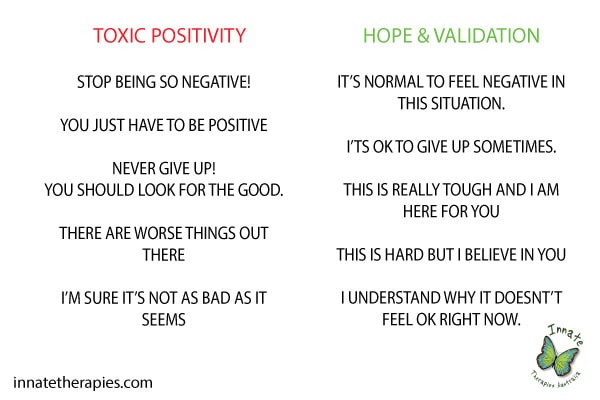In recent years, the concept of positive psychology has gained widespread popularity. It focuses on promoting mental well-being, happiness, and a positive outlook on life. While this approach has brought about numerous benefits, it has also given rise to a phenomenon known as “toxic positivity.”
Toxic positivity is when people focus too much on being positive, which can harm their mental health and emotions. In this blog, we’ll discuss toxic positivity, its effects, and how to find a good balance between being positive and genuine.
The Essence of Positive Psychology
- Understanding Positive Psychology
Positive psychology is a branch of psychology that focuses on the study of what makes life worth living. It seeks to identify factors that contribute to well-being, happiness, and fulfillment. Key aspects of positive psychology include the exploration of positive emotions, strengths, resilience, and overall life satisfaction. This is something we practice at Innate Therapies.
- The Benefits of Positive Psychology
Positive psychology has brought about many positive changes in the way we view mental health and well-being. Some of its benefits include:
Promotion of Well-being: Positive psychology encourages practices that promote well-being, such as gratitude, mindfulness, and positive thinking.
Increased Resilience: It helps individuals build resilience, enabling them to bounce back from life’s challenges and setbacks.
Enhanced Relationships: The principles of positive psychology can improve interpersonal relationships, fostering empathy and compassion.

Understanding Toxic Positivity
Toxic positivity can be defined as the overemphasis on positive thinking and the avoidance or denial of any negative emotions or experiences. It is the belief that one should always be happy, cheerful, and optimistic, regardless of the circumstances. Positive thinking is good, but toxic positivity goes too far by ignoring real feelings of sadness, anger, or frustration.
Common Signs of Toxic Positivity
Dismissing negative emotions: Individuals practicing toxic positivity often downplay or dismiss their own or others’ negative emotions. They may say things like, “Don’t be so negative” or “Just think positive thoughts.”
- Avoiding difficult conversations: Toxic positivity can lead to avoidance of important conversations about challenges, struggles, or conflicts because acknowledging them would mean confronting negativity.
- Masking true feelings: People may feel pressure to put on a facade of happiness even when they are experiencing pain, grief, or distress, leading to emotional suppression.
- Oversimplifying complex issues: Toxic positivity tends to oversimplify complex issues by suggesting that a positive attitude alone can solve all problems, which is unrealistic.
- Guilt and shame: Those who cannot maintain a relentlessly positive outlook may feel guilty or ashamed, believing they are failing to meet society’s expectations.
The Impact of Toxic Positivity
While toxic positivity may seem harmless on the surface, it can have significant negative consequences on an individual’s mental and emotional well-being:
- Emotional suppression: Constantly suppressing negative emotions can lead to emotional numbness, making it difficult to process and cope with difficult situations.
- Inauthenticity: The pressure to maintain a positive facade can lead to a sense of inauthenticity, causing individuals to disconnect from their true selves.
- Increased stress and anxiety: The inability to express genuine emotions can lead to heightened stress and anxiety as these feelings remain unaddressed.
- Undermining support systems: Toxic positivity can discourage individuals from seeking support or reaching out for help when they genuinely need it.
- Fostering a culture of denial: When toxic positivity is promoted on a societal level, it can lead to a culture that denies the existence of real problems and challenges.
The Harmful Consequences of Toxic Positivity
Suppression of Genuine Emotions
One of the most significant consequences of toxic positivity is the suppression of genuine emotions. When individuals are pressured to maintain a relentlessly positive attitude, they may bottle up their true feelings. This suppression can lead to increased stress, anxiety, and even physical health issues.
Feelings of Inauthenticity
Always pretending to be happy, even when you’re hurting, can make you feel fake and disconnected from who you really are. This disconnect can erode self-esteem and self-worth.
Unaddressed Issues
Avoiding difficult conversations and dismissing negative emotions can result in unresolved conflicts and issues. These unresolved problems may fester over time, potentially leading to more significant problems in the future.
Invalidating Others
Toxic positivity can also harm relationships by invalidating others’ experiences. Toxic positivity can make people feel like their pain and struggles are being ignored when they share them. This can lead to feelings of isolation and frustration.
Striking a Balance: Embracing Authentic Positivity
While positivity and optimism have clear benefits, it’s essential to strike a balance between positivity and authenticity. Here are ways to do so:
Acknowledge Negative Emotions
Recognize that it’s okay to experience negative emotions like sadness, anger, or frustration. These emotions are a natural part of the human experience and should not be suppressed or denied.
Encourage Open Communication
Create a safe space for open and honest communication, both with yourself and with others. Encourage discussions about difficult topics, validate each other’s experiences, and be willing to listen without judgment.
Practice Self-Compassion
Be kind to yourself during times of struggle. Treat yourself with the same compassion and understanding that you would offer to a friend facing difficulties. Self-compassion is an essential component of well-being.
Seek Professional Help
If you find it challenging to balance positivity and authenticity or are struggling with emotional difficulties, consider seeking support from a mental health professional. They can provide guidance and tools to navigate these challenges.
Navigating Toxic Positivity in Society
Toxic Positivity in the Age of Social Media
Social media platforms often perpetuate toxic positivity by promoting curated and idealized versions of people’s lives. It’s essential to recognize that what we see on social media may not reflect the full spectrum of human experiences. People do not always have good days.
Education and Awareness
Promoting awareness about toxic positivity and its potential harm is crucial. Educating individuals, schools, workplaces, and communities about the importance of embracing authentic emotions can help create more empathetic and understanding environments.
Innate Therapies Finding a Balance
Positive psychology has made significant contributions to our understanding of well-being and happiness. However, when taken to an extreme, it can lead to toxic positivity, which can be harmful to mental health and relationships.
At Innate Therapies we find striking a balance between positivity and authenticity is essential for genuine well-being.
Embracing our full range of emotions and encouraging open communication can lead to more fulfilling and empathetic lives. It’s time to unmask toxic positive psychology and make room for a more authentic, compassionate, and emotionally intelligent world.

